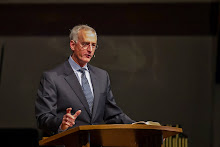The preacher’s danger:
To love to preach is one thing, to love those to whom we preach is quite another.
The golden rule:
At this point there is one golden rule, one absolute demand–honesty. You have got to be honest with your text.
The definition of preaching:
It is theology on fire.
The purpose of preaching:
What is the chief end of preaching? I like to think it is this. It is to give men and women as sense of God and His presence.
The romance and the realism of preaching:
Any many who has had some glimpse of what is it to preach will inevitably feel that he has never preached. But he will go on trying, hoping that by the grace of God one day he may truly preach.
Taken from Martyn Lloyd-Jones, Preaching and Preachers.
thegospelcoalition.org/blogs/kevindeyoung/
Monday, February 21, 2011
Tuesday, February 15, 2011
THE FATHER AND THE SON ARE ONE
So Jesus said to them, “Truly, truly, I say to you, the Son can do nothing of his own accord, but only what he sees the Father doing. For whatever the Father does, that the Son does likewise (John 5:19).
This is NOT a statement of humility, though Jesus certainly demonstrated humility; nor of inadequacy. This is a statement of equality with the Father; a statement of oneness and unity with God.
Leon Morris says this: “It is not simply that he does not act in independence of the Father; he cannot act in independence of the Father… the things the Father does, that the Son does too, not in imitation, but in virtue of his sameness of nature” (Leon Morris, The Gospel According to John, page 277).
There is never a conflict between the Father and the Son. They exist in perfect harmony. There are not two wills in which each yields to the other but their wills are in perfect unity because they are one. One’s will is the other’s will.
John Piper uses this phrase: “they act in perfect synchronization.”
The unity of the Father and Son is such that what the Father does the Son IS doing as well because they are one and do not act independently of each other. In other words, as S. Lewis Johnson put it in a sermon on this text, "the Father and the Son are not simply one in will, but one in essence."
This is NOT a statement of humility, though Jesus certainly demonstrated humility; nor of inadequacy. This is a statement of equality with the Father; a statement of oneness and unity with God.
Leon Morris says this: “It is not simply that he does not act in independence of the Father; he cannot act in independence of the Father… the things the Father does, that the Son does too, not in imitation, but in virtue of his sameness of nature” (Leon Morris, The Gospel According to John, page 277).
There is never a conflict between the Father and the Son. They exist in perfect harmony. There are not two wills in which each yields to the other but their wills are in perfect unity because they are one. One’s will is the other’s will.
John Piper uses this phrase: “they act in perfect synchronization.”
The unity of the Father and Son is such that what the Father does the Son IS doing as well because they are one and do not act independently of each other. In other words, as S. Lewis Johnson put it in a sermon on this text, "the Father and the Son are not simply one in will, but one in essence."
Subscribe to:
Posts (Atom)
